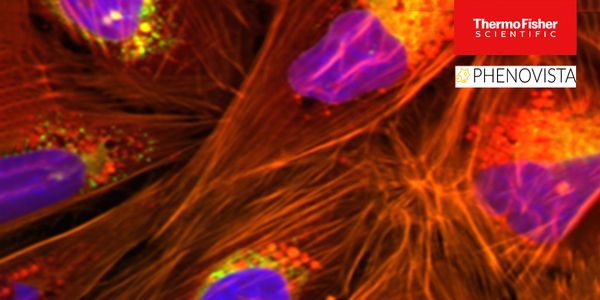3D Culture
3D Culture: is an artificially created environment in which biological cells are permitted to grow or interact with their surroundings in all three dimensions. Unlike 2D environments, a 3D cell culture allows cells in vitro to grow in all directions, similar to how they would in vivo.
-
FEB 08, 2024 | 10:00 AMHigh-content screening (HCS) is an imaging-based, multi-parametric strategy used in drug development that generates rich datasets through multiplexing strategically chosen fluorescent dyes a...JAN 23, 2024 | 10:00 AMOrganoid technologies are increasingly being used as in vitro models of human development and disease because they exhibit morphogenetic, structural and functional properties that recapitula...Speaker: Kalpana BarnesNOV 14, 2023 | 9:00 PMSpheroids and organoids, two examples of 3D cell culture models, have become invaluable tools to study the processes that dictate behavior of tissues under physiological and pathological con...OCT 24, 2023 | 8:00 AMOrganoids are three-dimensional (3D) multi-cellular, microtissues derived from stem cells that closely mimic the complex structure and functionality of human organs. They offer more accurate...OCT 24, 2023 | 10:00 AMOrganoids are three-dimensional (3D) multi-cellular, microtissues derived from stem cells that closely mimic the complex structure and functionality of human organs. They offer more accurate...AUGUST 10, 2023 2:00 PM ETThe growing push for 3D cell culture models is limited by technical challenges in handling, processing, and scalability to high-throughput applications....Speaker: Glauco Souza, PhD , Jan SeldinMAR 30, 2023 | 8:00 AMDate: March 30, 2023 Time: 8:00am (PST), 11:00am (EST), 5:00pm (CET) Join the Gibco Cell Culture Heroes webinar featuring Heather Beasley, PhD as she presents "SLC25A46 as a Novel Mitoc...FEB 15, 2023 | 7:00 AMDate: February 15, 2023 Time: 7:00am (PST), 10:00pm (EST), 4:00pm (CET) While not all microscopy samples can fluoresce, all can scatter light, and this scattered light can be imaged. This ha...Speaker: Philipp Kukura , Francesco Reina , Matthew Kose-Dunn , Phil AllenSponsored By: Teledyne PhotometricsFEB 08, 2023 | 9:00 AMDate: February 08, 2023 Time: 9:00am (PST), 12:00pm (EST), 6:00pm (CEST) Understanding cell-to-cell interactions in a tumor microenvironment are increasingly challenging due to the complexit...DEC 07, 2022 | 9:00 AMDate: December 07, 2022 Time: 9:00am (PST), 12:00pm (EST), 6:00pm (CET) Join us for an exciting live panel webinar, as we celebrate the 60th anniversary of Gibco Cell Culture. The panelists...Speaker: Jessica Hess , Rukia Henry , Ernesto Goulart , Ameet Chimote, PhDSponsored By: Thermo Fisher Scientific/GibcoSEP 15, 2022 | 9:00 AMDate: September 15, 2022 Time: 9:00am (PDT), 12:00pm (EDT), 6:00pm (CEST) Tyrosine kinases, a ubiquitous and diverse family of enzymes, are of considerable clinical interest because they dir...JUL 26, 2022 | 9:00 AMDate: July 26, 2022 Time: 9:00am (PDT), 12:00pm (EDT), 6:00pm (CEST) Organoids and spheroids are increasingly being used in many research applications, including drug discovery, toxicology,...JUN 28, 2022 | 9:00 PMDate: June 29, 2022 Time: 12:00pm (PST), 2:00pm (EST), 8:00pm (CEST) The burden of antimicrobial resistance (AMR) has been acknowledged worldwide by leading health institutes. Besides the ne...APR 19, 2022 | 5:30 AMC.E. CREDITSRecurrently emerging SARS-CoV-2 variants of concern (VOC) present increasingly sophisticated immune escape strategies that fuel global infection rates, as exemplified by the raging B.1.1.529...APR 06, 2022 | 5:30 AMIn the last decades, the upstream processing in biopharma industry has been revolutionized regarding the production of bioactive materials such as monoclonal antibodies, proteins and biother...FEB 23, 2022 | 11:55 PMCurrent drug discovery workflows are inefficient. 90% of therapeutic agents reaching clinical trials fail, predominantly because traditional laboratory experiments fail to adequately predict...Speaker: Audrey Dubourg, MSc, PhDPresented at: Drug Discovery & Development Virtual Event Series 2022
FEB 23, 2022 | 11:55 PMThe quest for alternatives to animal safety testing has fueled the development, characterization, and validation of many new technologies. There have been advances in cell and tissue models...DEC 08, 2021 | 11:00 AMDate: December 8, 2021 Time: 11:00am (PST), 2:00pam (EST) Breast cancer is the most common type of cancer and the leading cause of cancer deaths for women. Despite considerable ongoing resea...SEP 29, 2021 | 11:00 AMDate: Septembr 29, 2021 Time: 11:00am (PDT), 2:00pm (EDT) 3D cell models are becoming increasingly popular for studying complex biological effects, tissue functionality, and diseases. While...SEP 17, 2021 | 12:00 PMDate: September 16, 2021 Time: 9:00pm (PDT), 12:00am (EDT) 3D cellular models like organoids and spheroids offer an opportunity to better understand complex biology in a physiologically rele...JUL 01, 2021 | 12:00 PMDate: July 01, 2021 Time: 09:30am IST/12:00pm SGT/01:00pm JST, KST/03:00pm AEST/ 05:00pm NZST We know that understanding cell culture is essential for life of your work. Gibco Galaxy Tour We...APR 15, 2021 | 8:00 AMDate: April 15, 2021 Time: 8:00am PST Stem cell’s unique properties confer them a multitude of potential applications in the fields of cellular therapy, disease modelling and drug scre...MAR 25, 2021 | 8:00 AMDate: March 25, 2021 Time: 8:00am (PDT), 11:00am (EDT) Visikol is a biotechnology company focused on advanced imaging, digital pathology and 3D cell culture assays that has developed a un...FEB 03, 2021 | 12:30 PMIn vitro spheroid models are fast becoming the de facto standard for drug discovery applications, largely due to their human-like physiological and morphological characteristics, tissue-like...
FEB 08, 2024 | 10:00 AM
High-content screening (HCS) is an imaging-based, multi-parametric strategy used in drug development that generates rich datasets through multiplexing strategically chosen fluorescent dyes a...
JAN 23, 2024 | 10:00 AM
Organoid technologies are increasingly being used as in vitro models of human development and disease because they exhibit morphogenetic, structural and functional properties that recapitula...
Speaker:
Kalpana Barnes
NOV 14, 2023 | 9:00 PM
Spheroids and organoids, two examples of 3D cell culture models, have become invaluable tools to study the processes that dictate behavior of tissues under physiological and pathological con...
OCT 24, 2023 | 8:00 AM
Organoids are three-dimensional (3D) multi-cellular, microtissues derived from stem cells that closely mimic the complex structure and functionality of human organs. They offer more accurate...
OCT 24, 2023 | 10:00 AM
Organoids are three-dimensional (3D) multi-cellular, microtissues derived from stem cells that closely mimic the complex structure and functionality of human organs. They offer more accurate...
AUGUST 10, 2023 2:00 PM ET
The growing push for 3D cell culture models is limited by technical challenges in handling, processing, and scalability to high-throughput applications....
Speaker:
Glauco Souza, PhD
, Jan Seldin
MAR 30, 2023 | 8:00 AM
Date: March 30, 2023 Time: 8:00am (PST), 11:00am (EST), 5:00pm (CET) Join the Gibco Cell Culture Heroes webinar featuring Heather Beasley, PhD as she presents "SLC25A46 as a Novel Mitoc...
FEB 15, 2023 | 7:00 AM
Date: February 15, 2023 Time: 7:00am (PST), 10:00pm (EST), 4:00pm (CET) While not all microscopy samples can fluoresce, all can scatter light, and this scattered light can be imaged. This ha...
Speaker:
Philipp Kukura
, Francesco Reina
, Matthew Kose-Dunn
, Phil Allen
Sponsored By: Teledyne Photometrics
FEB 08, 2023 | 9:00 AM
Date: February 08, 2023 Time: 9:00am (PST), 12:00pm (EST), 6:00pm (CEST) Understanding cell-to-cell interactions in a tumor microenvironment are increasingly challenging due to the complexit...
DEC 07, 2022 | 9:00 AM
Date: December 07, 2022 Time: 9:00am (PST), 12:00pm (EST), 6:00pm (CET) Join us for an exciting live panel webinar, as we celebrate the 60th anniversary of Gibco Cell Culture. The panelists...
Speaker:
Jessica Hess
, Rukia Henry
, Ernesto Goulart
, Ameet Chimote, PhD
Sponsored By: Thermo Fisher Scientific/Gibco
SEP 15, 2022 | 9:00 AM
Date: September 15, 2022 Time: 9:00am (PDT), 12:00pm (EDT), 6:00pm (CEST) Tyrosine kinases, a ubiquitous and diverse family of enzymes, are of considerable clinical interest because they dir...
JUL 26, 2022 | 9:00 AM
Date: July 26, 2022 Time: 9:00am (PDT), 12:00pm (EDT), 6:00pm (CEST) Organoids and spheroids are increasingly being used in many research applications, including drug discovery, toxicology,...
JUN 28, 2022 | 9:00 PM
Date: June 29, 2022 Time: 12:00pm (PST), 2:00pm (EST), 8:00pm (CEST) The burden of antimicrobial resistance (AMR) has been acknowledged worldwide by leading health institutes. Besides the ne...
APR 19, 2022 | 5:30 AM
C.E. CREDITS
Recurrently emerging SARS-CoV-2 variants of concern (VOC) present increasingly sophisticated immune escape strategies that fuel global infection rates, as exemplified by the raging B.1.1.529...
APR 06, 2022 | 5:30 AM
In the last decades, the upstream processing in biopharma industry has been revolutionized regarding the production of bioactive materials such as monoclonal antibodies, proteins and biother...
FEB 23, 2022 | 11:55 PM
Current drug discovery workflows are inefficient. 90% of therapeutic agents reaching clinical trials fail, predominantly because traditional laboratory experiments fail to adequately predict...
Speaker:
Audrey Dubourg, MSc, PhD
Presented at: Drug Discovery & Development Virtual Event Series 2022
FEB 23, 2022 | 11:55 PM
The quest for alternatives to animal safety testing has fueled the development, characterization, and validation of many new technologies. There have been advances in cell and tissue models...
DEC 08, 2021 | 11:00 AM
Date: December 8, 2021 Time: 11:00am (PST), 2:00pam (EST) Breast cancer is the most common type of cancer and the leading cause of cancer deaths for women. Despite considerable ongoing resea...
SEP 29, 2021 | 11:00 AM
Date: Septembr 29, 2021 Time: 11:00am (PDT), 2:00pm (EDT) 3D cell models are becoming increasingly popular for studying complex biological effects, tissue functionality, and diseases. While...
SEP 17, 2021 | 12:00 PM
Date: September 16, 2021 Time: 9:00pm (PDT), 12:00am (EDT) 3D cellular models like organoids and spheroids offer an opportunity to better understand complex biology in a physiologically rele...
JUL 01, 2021 | 12:00 PM
Date: July 01, 2021 Time: 09:30am IST/12:00pm SGT/01:00pm JST, KST/03:00pm AEST/ 05:00pm NZST We know that understanding cell culture is essential for life of your work. Gibco Galaxy Tour We...
APR 15, 2021 | 8:00 AM
Date: April 15, 2021 Time: 8:00am PST Stem cell’s unique properties confer them a multitude of potential applications in the fields of cellular therapy, disease modelling and drug scre...
MAR 25, 2021 | 8:00 AM
Date: March 25, 2021 Time: 8:00am (PDT), 11:00am (EDT) Visikol is a biotechnology company focused on advanced imaging, digital pathology and 3D cell culture assays that has developed a un...
FEB 03, 2021 | 12:30 PM
In vitro spheroid models are fast becoming the de facto standard for drug discovery applications, largely due to their human-like physiological and morphological characteristics, tissue-like...
























